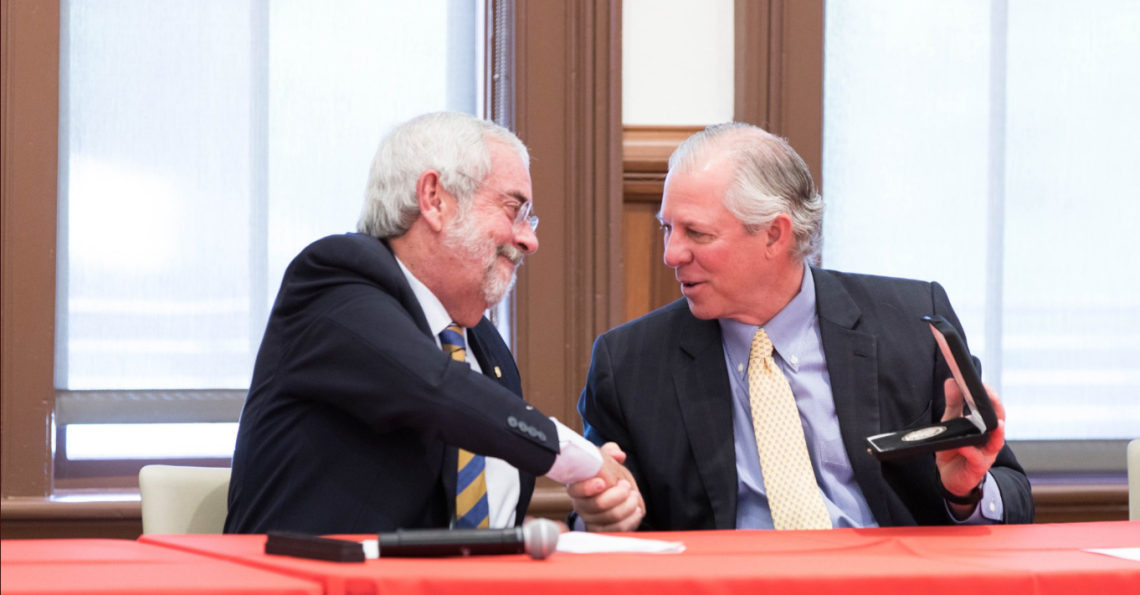UA and UNAM Launch Consortium on Human Rights

From April 16- 18, 2018 Dr. Enrique Graue Wiechers, the Rector of Universidad Nacional Autónoma de México (UNAM), visited the UA to discuss collaborations between UNAM and the UA in social science, science, engineering, humanities, and music. The two universities signed four agreements, including one to create a Binational Consortium on Migration, Human Security and Human Rights.
The consortium will design binational research projects, promote the exchange of faculty and students, and collaborate on teaching, research, and seminars.
On April 18, 2018, Dr. Enrique Graue Wiechers, the Rector of Universidad Nacional Autónoma de México (UNAM), and Robert C. Robbins, president of the UA, signed four agreements, including one to create a Binational Consortium on Migration, Human Security and Human Rights.
“SBS is eager to expand our already significant collaborations with UNAM,” said John Paul Jones III, dean of the UA College of Social and Behavioral Sciences. “As we see every day across the world, migration comes with tremendous human consequences. Faculty at the UA and UNAM have unmatched expertise in the drivers behind, and the implications of, migration between the United States and Mexico. This consortium will bring together the best of our scholars to conduct data-based social science research and derive sound, and joint, solutions that ensure human rights are protected and human security is enhanced.”
Faculty in the UA College of SBS and UNAM’s Coordinación de Humanidades met from April 5-7 on the UA campus to pave the way for the consortium. The objective of the meeting, which included 10 delegates from UNAM and 27 from the UA, was to find a model for scholarly interaction that will address critical aspects of migration, human security, and human rights shared by the United States and Mexico. UA faculty from the Colleges of Education and Humanities also participated, and the group will be augmented by colleagues from the College of Law as the initiative develops.
“Research by faculty in both countries has increased scientific knowledge around these issues; however, coordinated binational research is still scarce,” said Luis E. Coronado Guel, research associate and coordinator for SBS Mexico Initiatives.
At the UNAM-UA signing, John Paul Jones III, dean of the College of Social and Behavioral Sciences, discusses the collaboration between UNAM and SBS scholars.
The UNAM and SBS scholars identified numerous research areas that they want to collaborate on, including: border deaths; immigration enforcement; policies that impact refugees; environmental challenges; economic integration of returned families; media representations of migrants; public health issues related to Mexican and Central American populations; violations of indigenous rights in both the U.S. and Mexico; human rights violations against women; elite migration networks, and the cultural impacts of immigration policies.
Bill Simmons, director of the UA Human Rights Practice Program and professor in the Department of Gender and Women’s Studies, and Alethia Fernández de la Reguera, associate researcher at the Research Center for Gender Studies at UNAM, said that when researching human rights, they want to identify best practices for marginalized communities. “We want to look at resistance and resilience,” Simmons said.
The researchers discussed creating work teams, planning regular videoconferences, and designing a virtual space for sharing ideas and resources. The teams want to identify gaps in research and share data, contacts, and research networks. They also plan to thinking creatively about research methods, such as how to study “difficult to find” populations.
Marcela Vasquez, director of the UA Center for Latin American Studies, said that many borders could benefit from a binational examination, and she hopes that the consortium will be a model for other countries.

